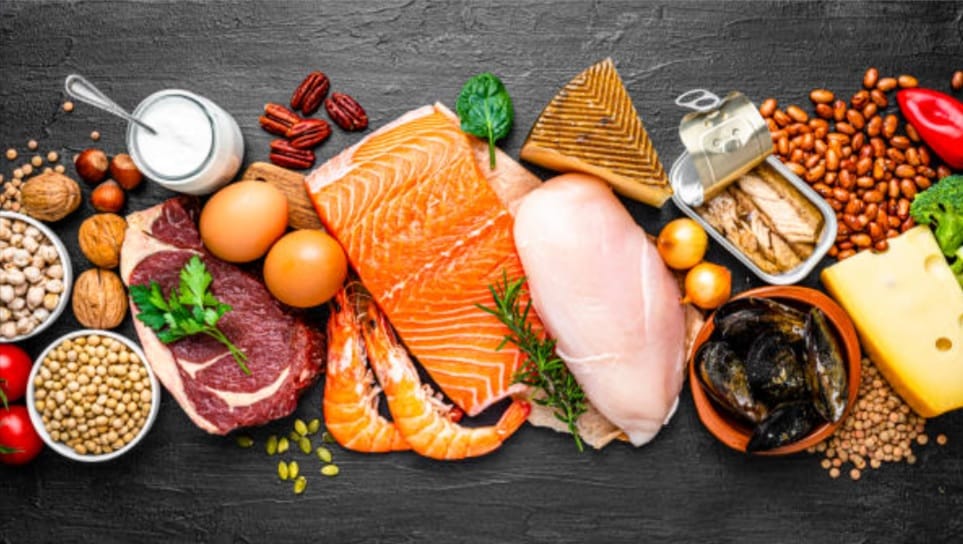The ketogenic (keto) diet has gained tremendous popularity in recent years, thanks to its ability to help with weight loss, improve mental clarity, and provide steady energy. One of the key components of the keto diet is getting the right balance of macronutrients—fats, proteins, and carbohydrates. But how much protein on a keto diet is optimal? This question often arises, and understanding it is critical for anyone aiming for success on the keto diet.
In this guide, we’ll break down everything you need to know about protein on a keto diet, including how much you should take, the best keto protein sources, and whether there’s such a thing as too much protein on keto. We’ll also dive into options like keto-friendly protein powders and keto protein shakes to help you maintain your protein intake while staying in ketosis.
What Is the Keto Diet?
Before we dive into protein specifics, let’s briefly cover what the keto diet is. A ketogenic diet is a low-carbohydrate, high-fat diet that forces your body to enter a metabolic state called ketosis. In ketosis, your body switches from burning carbohydrates (glucose) for energy to burning fat. This fat-burning process produces molecules called ketones, which provide energy for your brain and body.
To achieve ketosis, you need to drastically reduce your carbohydrate intake, usually to less than 50 grams of net carbs per day, and significantly increase your fat intake to around 70-75% of your daily calories. But where does protein fit in?
How Much Protein on a Keto Diet?
While fat is the primary fuel source on the keto diet, protein also plays a vital role. However, determining how much protein on a keto diet you should consume can be tricky because too much or too little protein can interfere with ketosis.
Protein Needs for Keto Dieters
The general rule for protein intake on a ketogenic diet is to consume moderate amounts. The exact amount of protein you need depends on several factors:
- Body Weight: Protein intake is often calculated based on body weight. A common recommendation is to consume about 0.6 to 1.0 grams of protein per pound of lean body mass. This translates to around 20-25% of your total daily calories.
- Activity Level: If you’re highly active, such as an athlete or someone who does regular strength training, you may need to consume more protein to help with muscle repair and recovery. On the other hand, if you’re sedentary, your protein requirements will be on the lower end.
- Goals: If your goal is weight loss, you may aim for the lower end of the protein range to stay in ketosis. If your goal is muscle maintenance or muscle gain, you’ll need to adjust your protein intake upwards.
Calculating Your Protein Needs
Here’s an example to help you calculate your protein intake:
- If you weigh 150 pounds and have 25% body fat, you have 112.5 pounds of lean mass (150 x 0.75 = 112.5).
- Based on the recommendation of 0.6-1.0 grams per pound of lean mass, you should aim for 67.5 to 112.5 grams of protein per day.
Too Much Protein on Keto: Does It Kick You Out of Ketosis?
One common concern for those on the keto diet is whether eating too much protein will prevent you from staying in ketosis. This is a valid concern because protein can be converted into glucose through a process called gluconeogenesis. If your protein intake is too high, it might increase blood sugar levels and insulin, potentially preventing your body from fully transitioning into ketosis.
Signs of Eating Too Much Protein on Keto
- Difficulty Entering Ketosis: If you’re struggling to get into ketosis, despite limiting your carbs and increasing your fat intake, excessive protein might be the culprit.
- Low Ketone Levels: If you’re using ketone strips or a ketone meter to test your levels and they are consistently low, it could be due to excess protein.
- Weight Stalls: If you stop losing weight or even gain weight while still following the keto diet, rechecking your protein intake may help.
However, most people do not need to worry too much about going overboard with protein, as gluconeogenesis is a demand-driven process. Your body only converts protein into glucose when it needs it, so moderate amounts of protein are unlikely to kick you out of ketosis.
What Happens If You Don’t Get Enough Protein on Keto?
While too much protein can interfere with ketosis, not getting enough protein can also be problematic. Protein is essential for muscle repair, immune function, and many other bodily processes. If you don’t consume enough, you may experience:
- Muscle Loss: Your body might start breaking down muscle tissue for energy if you’re not consuming adequate protein.
- Weakness or Fatigue: You may feel tired and weak due to muscle loss and poor recovery.
- Hunger: Protein helps with satiety, so too little can lead to increased hunger and cravings.
In short, the key to success is finding the right balance of protein that works for your body and goals.
Best Keto Protein Sources
Finding the best sources of protein on a keto diet is crucial to ensure you stay in ketosis while still meeting your body’s needs. Keto-friendly protein sources are typically low in carbs but rich in essential nutrients. Here are some of the best keto protein sources:
1. Animal-Based Protein
- Meat: Beef, pork, lamb, and other red meats are rich in protein and fat while containing zero carbs, making them ideal for a keto diet.
- Poultry: Chicken and turkey are leaner options, but their skin contains fat, making them great choices as well.
- Fish and Seafood: Fatty fish like salmon, mackerel, and sardines provide protein and healthy omega-3 fats. Shrimp, crab, and lobster are also excellent protein sources with little to no carbs.
- Eggs: Eggs are a versatile and affordable source of protein that fit perfectly into a keto diet. They also contain healthy fats and essential vitamins.
2. Dairy-Based Protein
- Cheese: Hard cheeses like cheddar, mozzarella, and Parmesan are not only delicious but also packed with protein and fat.
- Greek Yogurt: While regular yogurt contains too many carbs for keto, full-fat Greek yogurt can be consumed in moderation as it provides a good amount of protein with relatively low carbs.
- Cottage Cheese: Opt for full-fat versions to increase your protein intake while keeping carbs low.
3. Plant-Based Protein
- Tofu and Tempeh: These soy-based products are excellent options for vegetarians or vegans on keto. They are low in carbs and provide a decent amount of protein.
- Nuts and Seeds: Almonds, chia seeds, and flaxseeds offer protein and healthy fats, though they should be eaten in moderation to avoid consuming too many carbs.
Keto-Friendly Protein Powders
If you’re having trouble meeting your protein goals through food alone, you might consider adding a keto-friendly protein powder to your diet. These powders are specially formulated to be low in carbs and can be a convenient way to supplement your protein intake.
When choosing a protein powder for keto, look for ones that are low in carbohydrates and have minimal or no added sugars. Here are some popular options:
- Whey Protein Isolate: Whey isolate is one of the purest forms of protein, containing minimal carbs. It’s fast-digesting, making it great for post-workout recovery.
- Collagen Protein: Collagen protein supports joint and skin health. It’s typically carb-free and can be added to drinks, smoothies, or even coffee.
- Pea Protein: For those avoiding animal products, pea protein is a good plant-based option. Just make sure to check the carb content, as some plant-based proteins can be higher in carbs.
Keto Protein Shakes
If you’re constantly on the go or looking for a quick, easy way to consume protein, keto protein shakes are a fantastic solution. You can make them at home or buy pre-made ones, as long as you check the ingredients to ensure they align with your keto goals.
How to Make a Keto Protein Shake:
Here’s a simple recipe to create a keto-friendly protein shake at home:
Ingredients:
- 1 scoop of keto-friendly protein powder (whey isolate or collagen)
- 1 cup of unsweetened almond milk or coconut milk
- 1 tablespoon of MCT oil or coconut oil for added fats
- A handful of ice cubes
- Optional: A tablespoon of cocoa powder or a few drops of vanilla extract for flavor
Instructions:
- Combine all the ingredients in a blender.
- Blend until smooth and creamy.
- Pour into a glass and enjoy!
This shake will provide you with the necessary protein and fat while keeping your carbs low.
YOU MAY ALSO LIKE: Are Beans Keto Friendly?
Avoiding Too Much Protein on Keto
While we’ve already touched on the dangers of too much protein on keto, here’s a quick reminder of how to avoid it:
- Stick to Your Protein Goal: Use an app or food tracker to monitor your protein intake. This will help ensure you’re not consuming too much or too little.
- Balance Protein with Fat: Focus on high-fat protein sources like fatty cuts of meat, eggs, and cheese. This helps you meet your fat goals while keeping your protein moderate.
- Avoid Lean Meats: While lean meats like chicken breast and turkey are high in protein, they lack fat. Opt for fattier cuts or add fat to your meals.
Finding the Right Balance of Protein on Keto
Getting the right amount of protein is essential for success on a keto diet. While fat is the main focus, protein plays a critical role in maintaining muscle mass, aiding in recovery, and keeping you full. Aim for moderate protein intake—roughly 0.6 to 1.0 grams per pound of lean body mass—and adjust based on your activity level and goals.
Whether you prefer whole food sources or supplements like keto-friendly protein powders and keto protein shakes, there are plenty of options to help you hit your protein targets without jeopardizing ketosis. Just be mindful of the dangers of too much protein on keto, and balance your intake to ensure you stay in ketosis while supporting your body’s needs.


